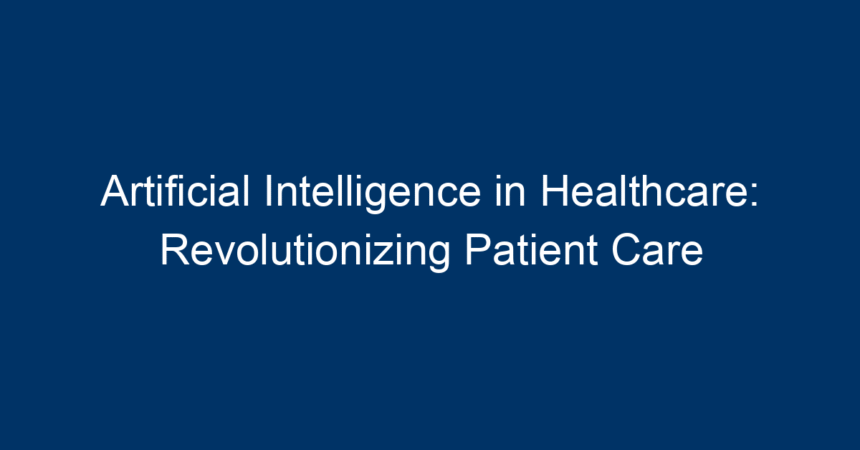Introduction
In today’s rapidly evolving world, artificial intelligence (AI) in healthcare stands as a transformative force poised to revolutionize patient care. From predictive analytics to personalized treatment plans, AI technologies are reshaping how medical professionals diagnose, treat, and manage patient health. As the healthcare industry faces increasing pressures from rising costs, a growing aging population, and the demand for efficient services, AI offers innovative solutions that not only improve patient outcomes but also streamline operational inefficiencies. This article will delve into the multitude of ways AI is reshaping healthcare, its benefits, challenges, and what the future holds.
The Power of Predictive Analytics
One of the most impressive applications of artificial intelligence in healthcare is predictive analytics. AI algorithms analyze vast datasets, enabling healthcare providers to foresee patient health trends and potential risks.
Predicting Disease Outbreaks
AI can forecast disease outbreaks by examining patterns in various data sources, including social media, weather updates, and historical health records. For instance, in the early stages of the COVID-19 pandemic, AI models analyzing online searches and healthcare data were instrumental in predicting outbreaks and directing resources.
Early Diagnosis
Doctors increasingly rely on AI to identify conditions such as cancer at early stages. Machine learning algorithms can analyze medical imaging with an accuracy that matches, and often surpasses, human radiologists. This capability allows for quicker, more accurate diagnoses, significantly improving the chances of successful treatment.
Personalized Treatment Plans
Personalized medicine is another breakthrough greatly enhanced by AI technologies. As we acknowledge that no two patients are the same, AI facilitates tailor-made treatment plans based on individual patient data.
Genomic Data Analysis
With advancements in genomics, AI can analyze individual genetic profiles and recommend customized treatment strategies. For example, in oncology, AI systems can interpret genetic mutations in tumors to suggest targeted therapies, leading to more effective and less harmful treatment options.
Smart Wearables and Continuous Monitoring
Wearable health technology is another frontier where AI plays a significant role. Devices equipped with AI can monitor vital signs in real-time, gathering data that helps healthcare providers adjust treatment plans on-the-fly, thus ensuring optimal patient care.
Streamlining Administrative Efficiencies
Beyond direct patient care, artificial intelligence in healthcare also optimizes administrative processes. By automating repetitive tasks, AI frees healthcare professionals to focus on what they do best—caring for patients.
Reducing Administrative Burden
AI-driven software can automate cumbersome tasks such as scheduling appointments and managing billing inquiries. This automation reduces complaints related to scheduling conflicts and insurance queries, enhancing overall patient satisfaction.
Resource Allocation
AI tools can analyze patient volumes and outcomes, helping healthcare facilities manage resources more effectively. Hospitals can utilize these insights to predict staffing needs or determine which departments require additional support during peak times.
Enhancing Patient Engagement
AI is instrumental in promoting patient engagement, which is crucial for improving health outcomes. Engaged patients are more likely to comply with treatment plans and follow-up appointments.
Chatbots and Virtual Health Assistants
AI-powered chatbots serve as frontline support for patient inquiries. They can help schedule appointments, provide medication reminders, and answer common health questions, all contributing to a more seamless patient experience.
Tailored Health Information
AI can personalize patient education materials based on an individual’s health condition and preferences. By providing relevant and digestible information, AI encourages patients to take an active role in managing their health.
Overcoming Challenges in Implementation
While the potential benefits of artificial intelligence in healthcare are immense, several challenges must be addressed to ensure successful implementation.
Data Privacy and Security
The use of AI necessitates access to vast amounts of personal health data, raising concerns about privacy and security. Healthcare providers must implement robust cybersecurity measures to protect sensitive information from data breaches.
Interoperability
AI systems must be able to communicate seamlessly with existing IT infrastructure in healthcare organizations. Lack of interoperability can create barriers to effective AI implementation. A unified approach is necessary for AI tools to work harmoniously within diverse healthcare ecosystems.
Healthcare Equity
There is also the concern that AI may unintentionally perpetuate or exacerbate existing healthcare disparities. Ensuring that AI systems are trained on diverse datasets is crucial to avoid biases that could lead to unequal treatment.
The Future of Artificial Intelligence in Healthcare
Looking ahead, the trajectory of artificial intelligence in healthcare promises profound advancements. With ongoing research and development, we can expect even more sophisticated tools that enhance patient care and streamline healthcare operations.
AI-Driven Drug Discovery
AI is significantly influencing drug discovery by predicting how different compounds will behave in the human body. This capability can drastically cut down on the time and costs associated with bringing new drugs to market, ultimately leading to faster patient access to groundbreaking treatments.
Continuous Learning Systems
The future may witness the development of AI systems that learn from every patient interaction, continuously improving their diagnostic and predictive capabilities. Such advancements will make healthcare more adaptable, responsive, and effective.
Conclusion: Actionable Insights
As we stand on the brink of an AI healthcare revolution, several actionable steps can be taken by stakeholders in the healthcare industry:
-
Invest in AI Infrastructure: Healthcare organizations should allocate resources to build robust IT systems capable of integrating AI tools effectively.
-
Prioritize Data Security: Implement strong cybersecurity measures to protect patient data and build consumer trust.
-
Promote Training and Education: Equip healthcare professionals with the necessary skills to leverage AI technologies effectively.
-
Focus on Diversity: Ensure AI algorithms are trained on diverse datasets to promote equitable health outcomes for all populations.
- Engage Patients: Utilize AI tools to enhance patient engagement, encouraging individuals to take charge of their health.
The future of artificial intelligence in healthcare is bright, and by strategically harnessing its power, we can revolutionize how we approach patient care, making it more personalized, efficient, and equitable. The time to embrace this change is now—because the health of our communities depends on it.




